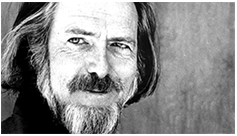This 2-Minute Story Can Change Your Life
“I want to make one thing absolutely clear. I am not a Zen Buddhist, I am not advocating Zen Buddhism, I am not trying to convert anyone to it. I have nothing to sell. I'm an entertainer....
That is to say, in the same sense that when you go to a concert and you listen to someone play Mozart, he has nothing to sell except the sound of the music. He doesn’t want to convert you to anything. He doesn’t want you to join an organisation in favour of Mozart's music as opposed to, say, Beethoven's. And I approach you in the same spirit, as a musician with his piano or a violinist with his violin. I just want you to enjoy a point of view that I enjoy.” — Alan Watts
Alan Watts (1915 – 1973) was an influential writer and speaker best known for popularising a range of Eastern concepts of spirituality for the West during the 50s and 60s, particularly Zen Buddhism, decades before meditation and mindfulness-based stress reduction became a hit thing in the business world. In fact, probably no person has done more to make ancient Zen teachings more visible and palatable in our modern culture than Watts. The British-born philosopher (I think “philosopher” is the best single-word identifier, though Watts is hard to define exactly) wrote several books, perhaps the most well-known of which is The Way of Zen (1957). I refer to him as the Morpheus of YouTube. It’s easy to find many hours of his recorded lectures online — dozens and dozens of metaphysical mind-benders — many of which have been put to stunning visual montages, leaving you at the end of each video with a feeling of, “Wooah, what even is life?” A charismatic, funny, and gifted storyteller, Watts could easily have founded a new religious movement, and yet he insisted not on converting but on conversing — sharing philosophical musings as musicians and street performers share their art. If you ever feel that you might be on the verge of going mad, or that everyone around you is mad, you’ll find solace and sanity in the words of wisdom from this man of uncommon insight.
Among the most powerful and famous Zen stories is the story of the Chinese farmer. Numerous versions of the story exist and Watts' telling is as good as any.
Animation by Steve Agnos, video courtesy of Sustainable Human
Transcript:
Once upon a time, there was a Chinese farmer who lost a horse. Ran away. And all the neighbours came around that evening and said, “that’s too bad.”
And he said, “maybe.”
The next day, the horse came back and brought seven wild horses with it. And all the neighbours came around and said, “why, that’s great, isn’t it?”
And he said, “maybe.”
The next day, his son, who was attempting to tame one of these horses was riding it and was thrown and broke his leg and all the neighbours came around in the evening and said “well, that’s too bad, isn’t it?”
And he said, “maybe.”
And the next day, the conscription officers came around looking for people for the army and they rejected his son because he had a broken leg, and all the neighbours came around that evening and said, “Isn’t that wonderful?”
And he said, “maybe.”
[laughter]
The whole process of nature is an integrated process of immense complexity and it is really impossible to tell whether anything that happens in it is good or bad, because you never know what will be the consequences of a misfortune. Or, you never know what will be the consequences of good fortune.
Topics:
Psychology
Theo Winter
Client Services Manager, Writer & Researcher. Theo is one of the youngest professionals in the world to earn an accreditation in TTI Success Insight's suite of psychometric assessments. For more than a decade, he worked with hundreds of HR, L&D and OD professionals and consultants to improve engagement, performance and emotional intelligence of leaders and their teams. He authored the book "40 Must-Know Business Models for People Leaders."

.png?width=374&name=Smarter%20Thinking_%20The%20Socratic%20Method%20(4).png)
/creating%20a%20child%20prodigy_%20the%20female%20chess%20master.png?width=374&name=creating%20a%20child%20prodigy_%20the%20female%20chess%20master.png)
We Would Like to Hear From You (0 Comments)